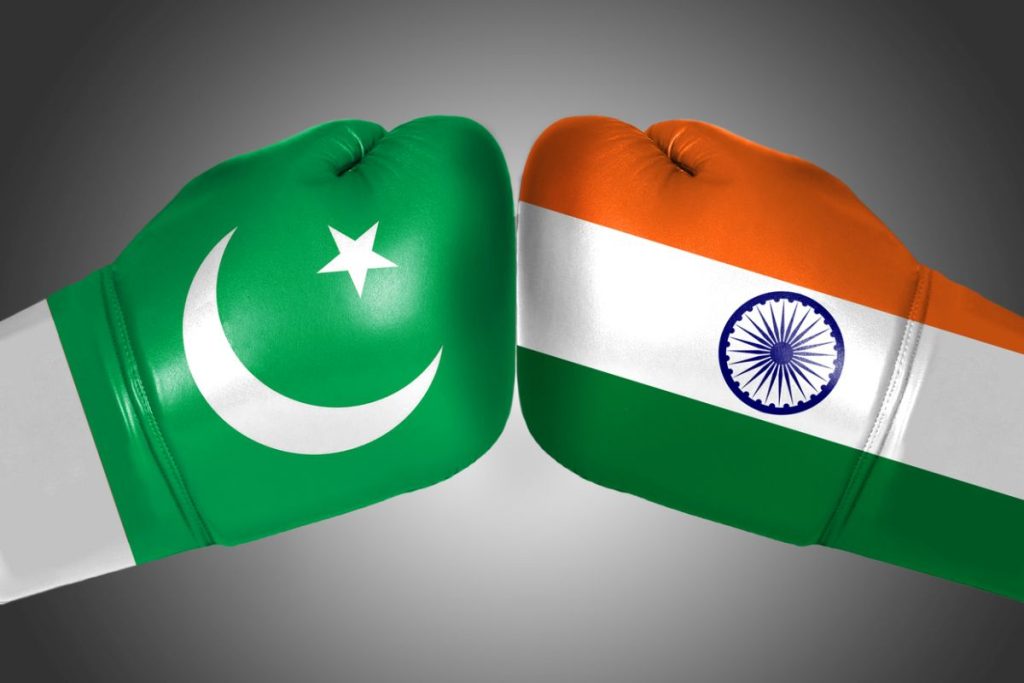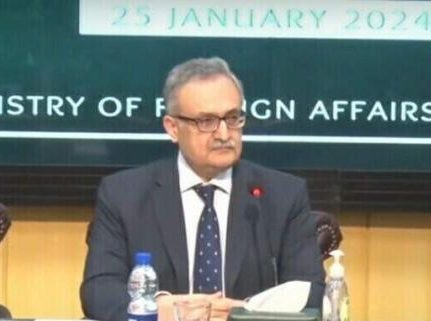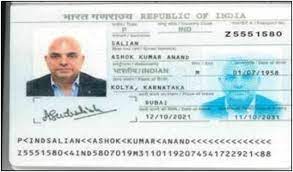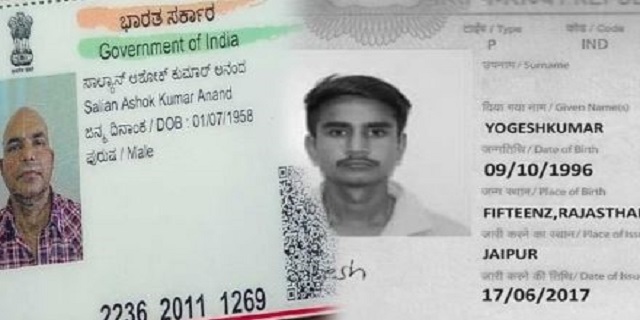
India was running a ‘sophisticated and sinister’ campaign of ‘extra-territorial and extra-judicial killings’ inside Pakistan: Syrus Sajjad Qazi
Says Islamabad had ‘credible evidence’ of links b/w Indian agents & the assassination of two Pak nationals in Sialkot & Rawalakot
Says Indian agents used technology and safe havens on foreign soil to commit assassinations in Pakistan
ISLAMABAD ( Web News )
Foreign Secretary Muhammad Syrus Sajjad Qazi on Thursday said Islamabad had “credible evidence” of links between Indian agents and the assassination of two Pakistani nationals in Sialkot and Rawalakot.
Muhammad Syrus Sajjad Qazi was referring to the deaths of two Pakistanis, identified as Shahid Latif and Muhammad Riaz, in 2023. Similar allegations regarding the Indian government’s involvement in murders in other countries were also made by the US and Canada last year.
At a press briefing in Islamabad on Thursday along with Foreign Office Spokesperson Mumtaz Zahra Baloch, Foreign Secretary Muhammad Syrus Sajjad Qazi said India was running a “sophisticated and sinister” campaign of “extra-territorial and extra-judicial killings” inside Pakistan. He stated that these were “killing-for-hire cases” and involved a “sophisticated international set-up spread over multiple jurisdictions”.

“Indian agents used technology and safe havens on foreign soil to commit assassinations in Pakistan. They recruited, financed and supported criminals, terrorists and unsuspecting civilians to play defined roles in these assassinations,” he said.
According to Syrus Sajjad Qazi, Indian media and social media accounts immediately claimed and glorified these killings as “successful retribution against enemies of India and projected their capacity to carry out these illegal acts”.
He said potential assassins were recruited using social media, talent spotters and fake Daesh accounts. “Teams of financiers, locaters and assassins were employed in the operation,” Qazi stated, adding that deliberate exit plans were also developed to obscure all potential tracks.
Revealing details about the assassinations, he said: “On October 11, 2023, Shahid Latif was assassinated outside a mosque in Sialkot. A detailed investigation revealed that an Indian agent, Yogesh Kumar, based in a third country orchestrated the assassination.”
Syrus Sajjad Qazi said Kumar recruited Muhammad Umair, a labourer in the third country, to act as a contact with local criminals in Pakistan to trace and assassinate Shahid Latif. “They recruited local criminals who were able to locate and trade Shahid Latif, however, they were unable to carry out the execution.”

“After some of the failed attempts, Umair himself was personally sent to Pakistan to carry out the assassination,” the foreign secretary said, adding that Umair organised a team of five target killers and succeeded in assassinating Shahid Latif.
“Based on the confessional statements and technical evidence, law enforcement authorities quickly apprehended the target killers, including Muhammad Umair, who were trying to flee the country on Oct 12, 2023,” Qazi said.
He added that all those involved in the killings were apprehended and a case was being tried in the court of law. “We have evidence of transactions made in the process linking the entire chain to Indian agent Yogesh Kumar,” Qazi said.
Talking about the second assassination, the foreign secretary said another Indian agent was involved in the killing of a Pakistan man, identified as Muhammad Riaz, who was “assassinated during Fajr prayers inside a mosque in Rawalakot on September 8, 2023”.
“Law enforcement agencies tracked the killer, Muhammad Abdullah Ali, and arrested him on September 15, 2023, while boarding a flight at Jinnah International Airport in Karachi,” Qazi stated, adding that interrogation revealed Ali was recruited and guided by Indian agents Ashok Kumar Anand and Yogesh Kumar.
He said Indian agents used the social media platform Telegram to recruit Ali, claiming that Ali received payments and was provided with weapons and ammunition. Qazi added that the case was being tried in the court of law.

The foreign secretary went on to say that the investigators “quickly identified” Ali’s facilitators on the basis of confessional statements and technical evidence. “We have documentary, financial and forensic evidence of the involvement of the two Indian agents who masterminded these assassinations,” he said, adding that the Pakistan government was releasing the passport details of these agents.
Qazi further said that Islamabad had also reached out to the governments of relevant third countries. “There are a few other cases of similar gravity at various stages of investigation,” he added.
He stated that these cases revealed a “growing sophistication and brazenness of Indian-sponsored terrorist acts in Pakistan”, highlighting that such incidents were also reported in Canada and the US. “Clearly the Indian network of extra-judicial and extra-territorial killings has become a global phenomenon,” the foreign secretary said.
He asserted that it was critical to bring the killers, their facilitators and financiers to justice. “India must be held accountable internationally for its blatant violation of international law. India’s assassination of Pakistani nationals on Pakistani soil is a violation of its sovereignty and a breach of the UN charter,” Qazi stressed, calling it “completely unacceptable”.
He maintained that Pakistan remained committed to protecting its people and securing its sovereignty, asserting that the protection of Pakistan and any foreign national on Pakistani soil “is a high priority” for the government.
“India’s reckless and irresponsible act calls into question India’s reliability as a credible international player and its claims for enhanced global responsibilities,” Qazi added.
Qazi also shared the conclusions drawn from the above-stated information, saying that these cases reveal the growing sophistication and brazenness of Indian-sponsored terrorist acts in Pakistan.
He said that the cases fit the pattern of similar cases that have come to light in other countries, including Canada and the United States, clearly showing that the Indian network of extra-judicial and extra-territorial killings has become a global phenomenon.
“Pakistan has remained a target of extra-judicial killings for some time now. We are now witnessing an increased sophistication in these operations as revealed in these two cases,” he said.
Qazi called for India’s accountability on an international level for its “blatant violation of international law,” saying that the assassination of citizens on Pakistani soil was not only a violation of the country’s sovereignty but also a breach of the UN Charter.
“This violation of Pakistan’s sovereignty by India is completely unacceptable,” he stressed.
He then demanded bringing to justice the killers, their facilitators and financers involved in the assassinations of Pakistani nationals and extra-judicial and extra-territorial killings in other countries.
In the concluding remarks, Qazi said that Pakistan remains committed to protecting its people and securing its sovereignty.
“Protection of Pakistanis and any foreign national on Pakistani soil is a high priority for the Government of Pakistan,” he said.
One of these two cases traces back to the Daska mosque shooting of Shahid Latif, who was an activist of the banned Jaish-e-Muhammad (JeM), in October last year.
Pakistan called out the country involved in the attack as a “rogue nation” for carrying out the terrorist activity right after the incident.
